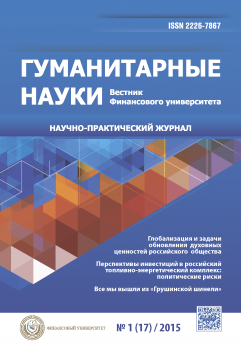Russia’s strengthening in the world arena although based on the integration of the country into global and regional political and economic institutions and reinforced by its attempts to restore position in key regions did not result in complex foreign policy strategy towards neighbor-countries of post-Soviet space. Most former Soviet republics are on the margins of Russian foreign policy activity. They are perceived by Russian political and economic elites as partners “by default”, definitely depended on bilateral economic ties with Russia. The author uses the metaphor of margins to describe the above-mentioned group of countries as politically and economically important for Russia but in real Russia’s foreign policy activity and priorities ranked second with no complex long-term strategies be implemented to them. That means that Russian diplomacy needs to react to challenges coming from the former Soviet republics and it does not followproactive way in dealing with these countries. Russia’s ambition to be equal partner to major global actors can be realized only in the context of loyal, stable and friendly geopolitical neighborhood of the former Soviet republics. One of the measures to achieve such neighborhood is to pursue further development of Eurasian Economic Union (EEU). Today this institution needs much attention from its members meaning the necessity to elaborate on EEU long-term strategy in the context of on-going economic instability and increasing external threats. This article provides an analysis of the existing Russian foreign policy potential to be implemented to the former Soviet republicsin order to achieve the goal of forming loyal, politically and economically predictable neighborhood. The research is based on comparative and case-study analysisextended by the study of documents regulating contemporary Russian foreign policy. The research results in formulating three group of mid-term tasks for Russian foreign policy in the post-Soviet space. Three types of recommendations are highlighted to make Russia’s foreign activity in this direction more efficient.
Russia, foreign policy, post-Soviet space, former Soviet republics, foreign policy strategy.
1. Markedonov S.M. Proshchanie s «postsovetskim prostranstvom»? [Farewell to the «post-Soviet space»?]. Available at: http://russiancouncil.ru/inner/?id_4=7015#top-content (accessed 31 January 2016).





